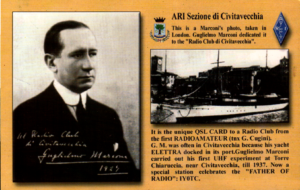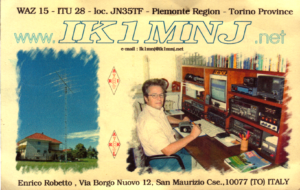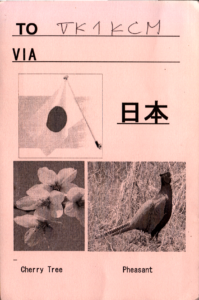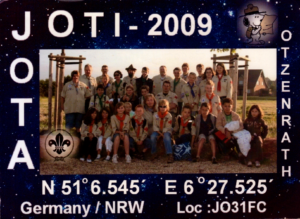
Inwards QSL Bureau
The CRARC Inwards QSL Bureau acts as a central clearing house for QSL Cards arriving from foreign countries as well as other Australian (VK) call areas.
The service is free to either Club or WIA members, but you do need to make arrangements for collection or on-forwarding of your cards.
How it works
Most DXCC countries offer an “outwards” QSL service that operates much in the same manner as the CRARC outwards QSL service. Radio operators in foreign countries and other Australian Divisions send QSL cards to their outwards bureau where the cards are packaged with cards from other operators and sent to the relevant QSL Bureaus.
When a package of QSLs arrives at the CRARC Bureau, cards are sorted into two groups:
- cards for local VK1 (ACT) and VK2 (NSW) CRARC members;
- cards mis-sent to the ACT QSL Bureau which need to be forwarded to other QSL Bureaus.
Cards for local operators are further sorted by callsign suffix and stored for collection.
Claiming QSLs

There are several ways to claim your QSL cards
- Attend a CRARC meeting (held the fourth Wednesday of every month at 8pm);
- Keep several self-addressed stamped envelopes (minimum size 110x220mm) on file with the ACT Bureau Manager which will be used to forward cards to you via the mail.
- Contact the Inwards QSL Bureau Manager and make arrangements to pick them up in person.
The current Inwards QSL Manager is John Clare VK1CJ. You can contact him by email via the committee email address: committee “at” crarc.org.au
The Inwards Bureau Needs Your Co-operation
Notify the Bureau;
- if you DO NOT want your cards.
- if your callsign changes so the Bureau can cross reference cards for old calls with new calls.
- if you are moving out of the area and make arrangements for handling cards that arrive after you leave.
- of QSL information for DXpeditions, special event, club stations or other special situations where the ACT Bureau is to be used to receive cards.
Unclaimed QSL Cards
Unclaimed QSL cards are the Bureau’s biggest problem. Leaving the QSLs unclaimed in the bureau indefinitely takes a significant amount of storage space and operators who send cards requesting a return QSL are left wondering if they will ever get a card. Not responding to QSL requests:
- contributes to the perception that “VK hams are poor QSLers”;
- fails to foster international goodwill;
- results in disappointment for the DX station.
The Bureau has an obligation to handle incoming QSL cards in a timely manner and unclaimed QSLs can not be left indefinitely. To reduce unclaimed cards the Bureau maintains a list of
- silent keys, and
- local operators who do not QSL.
Cards that state “Thanks for QSL” will be sent to the National WIA QSL collection. Cards which state “Please QSL” will be returned wherever possible to the sender Bureau stamped “Card Unclaimed” or ” Silent Key”, as appropriate.
The QSL Manager will attempt to determine how operators wish to collect unclaimed cards. Cards from operators who do not claim their cards within 12 months will be returned to the relevant QSL Bureau marked unclaimed.
The VK1 Outwards QSL Service

The purpose of the CRARC Outwards QSL Bureau is to facilitate the exchange of QSL cards between Club members and radio amateurs outside the ACT.
The service is free for Canberra Region Amateur Radio Club or authenticated WIA Members.
One of the greatest benefits of Club membership is being able to use the Outward QSL Bureau to send QSL cards to amateurs in other Australian States and overseas through their QSL Bureaus. The savings made through Club membership compares more than favourably with the cost of individual QSL’ing.
QSL cards are shipped to the WIA National outwards QSL Bureau as required depending on the numbers received. Shipments are generally in excess of three times a year. From the national QSL bureau QSL cards are shipped to other QSL Bureaus typically maintained by the national Amateur Radio Society of each country. NOTE: No cards are sent to individual amateurs or individual QSL managers by the outwards QSL bureau, cards only get forwarded to other bureaus.
How To Use The VK1 Outward QSL Service
- Cards for the Outward QSL Service should conform to a standard size range:
- Height = 70 to 100 mm, Width = 120 to 150 mm. (Ideally no larger than 95mm by 140mm).
- Cards in this range can be easily sorted, stacked and packaged. Cards outside this range create problems. Larger cards do not fit easily into standard envelopes – they often cannot be handled without folding or otherwise damaging them. Smaller cards are difficult to sort and handle. It is in the QSLers interest to conform to these recommendations.
- Print the callsign of the station clearly and additionally on the top right corner of the card, so that sorting is made easy..
- Pre-sort your QSL’s alphabetically by call-sign prefix (BV, CX, DK, DL, ES, FY, G, GI, K1, K2, PA, PZ, 3B8, 4X, and so on). When sorting countries that have multiple prefixes ( eg Russia), keep that country’s prefixes grouped together in your alphabetical stack.
- There is no limit to the number of cards which may be sent at any one time.
- The cards can be given to the Outward QSL Bureau manager (or committee member if the manager is not present) at the monthly CRARC meeting. If that is not possible or convenient then alternative arrangements can be made by contacting the Outwards QSL Bureau manager.
The present Outwards QSL Manager is Mike VK1OO. You can contact him by email via the committee email address: committee “at” crarc.org.au
Outward QSL Operation

Countries without QSL Bureaus cannot be serviced. A list of countries with QSL bureaus can be found at: https://www.iaru.org/reference/qsl-bureau-2/
The outward QSL bureau will only forward cards from financial members of the Canberra Region Amateur Radio Club or from authenticated WIA Members. Cards from non CRARC or WIA persons will not be handled. All WIA Members are entitled to send their cards (sorted in DXCC country order) directly to the WIA Outwards QSL Bureau if they so desire, addressed as follows: WIA Outwards QSL BureauP.O. Box 66Boolaroo NSW 2284
Other QSL Services
In the case of DXpeditions and/or active DX stations that use QSL managers, it is often a better approach to QSL directly to the QSL manager and not via the CRARC / WIA bureaus. Various DX newsletters, QSL manager directories, Internet reflectors, internet and other publications are good sources of up-to-date QSL manager information.
QSLs may be sent to QSL managers via the QSL Bureau, but note that some dxpeditions and DX stations stipulate direct QSLing only.
